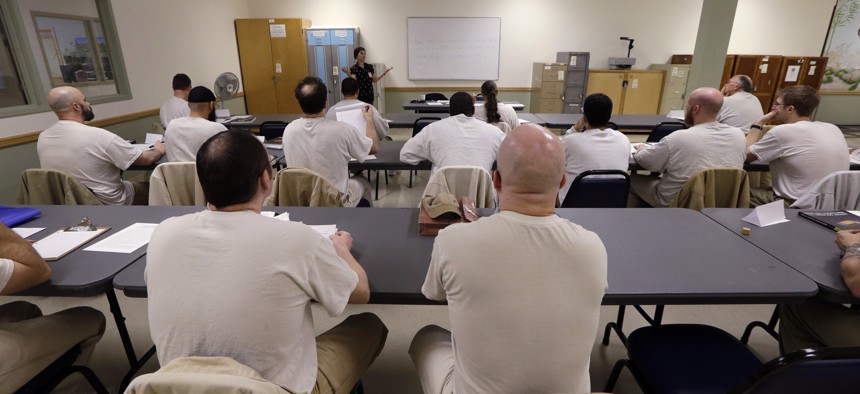A State Will Require Civics Education in Prisons

Education programs in prisons are spread throughout the country, but Illinois will be the first to require civics classes. Elaine Thompson/AP Photo
The goal of the new Illinois law is to reduce recidivism, help former prisoners reintegrate into their communities, and boost voter turnout.
Every year, 30,000 people leave Illinois prisons and reenter society. Many of them hold the false belief that their time in prison prohibits them from voting for the rest of their life, as it does in several other states, including three of Illinois’ five neighbors. But while Illinois restores voting rights to people immediately upon their release from prison (even if they are still serving parole or probation), many former prisoners don’t know that, or if they do, they don’t know how to register to vote.
A new law, set to take effect at the start of 2020, seeks to change that by making people in prison more aware not only of their voting rights, but also of how government works more generally. The Re-Entering Citizens Civics Education Act makes Illinois the first state to require prisons to offer civics education classes that will be taught by incarcerated peer educators who have been trained by nonpartisan civics organizations.
Prisons around the country, from Florida to Texas, have implemented similar classes, but until now, no state has mandated they be held at all state institutions for both adult inmates and young people 17 years of age or older in juvenile detention.
Ami Gandhi, the director of voting rights and civic empowerment at the Chicago Lawyers' Committee for Civil Rights, an organization that worked to draft the civics bill, said that the idea for the class came from incarcerated and returning community members. “While Illinois is branded as a state that offers automatic restoration of voting rights, that doesn’t mean registration is automatic,” she explained. “The bureaucratic process of registering to vote has been a barrier for many community members with past criminal records because they didn’t know the process they had to go through to exercise their right to vote.”
The legislation will require Illinois Department of Corrections and Illinois Department of Juvenile Justice facilities to offer civics education classes as a mandatory part of the standard release process, meaning everyone who has just a year left before release from prison has to attend the course.
The bill’s sponsor, state Sen. Robert Peters, a Chicago Democrat, said that he was interested in pushing the legislation forward after sitting in on a similar class in Statesville Prison run by an organization called Chicago Votes. “I gained a very progressive view of what safety and justice really look like,” he said. “Folks stuck behind bars should know what their rights are as soon as they’re out, and they should know about the systems that impact their lives as they approach freedom.”
The course will consist of three 90-minute sessions, and will cover the voting process, government, and current affairs. Subjects that peer educators may cover include how elections work, how the federal government interacts with city and state governments, how to register to vote, and how bills become laws.
People in the last 12 months of their sentence already are required to attend similar workshops that teach them how to find housing and get healthcare, and Peters said that voting should be considered just as important. “Historically, prisons have been some of the most political places in America,” he said. “This will help them flex those same political muscles to affect electoral change once they get to the outside.”
Peters also said that having the classes be taught by incarcerated peer educators is a key component of the legislation, because it will empower them to learn about civics and share it with others. Those peer educators will be trained by organizations like Chicago Votes, which is experienced working with incarcerated people.
The organization not only teaches classes in prisons, but earlier this year also brought polling booths into the Cook County Jail in Chicago so that people in pretrial detention could cast their votes. Roughly 600 people marked ballots that day— a moment that inspired a second piece of legislation that Democratic Gov. J.B. Pritzer signed into law on the same day as the civics education bill. That legislation requires Cook County to establish a polling place at the jail for each election, and requires that jails in smaller counties make absentee voting more accessible.
“It’s a new day in Illinois—one where we not only recognize the sanctity of the vote but commit to doing everything we can to invite everyone who is eligible to fully participate,” Pritzker said in a statement. “In Illinois, we understand that every vote matters and every vote counts.”
Earlier this year, Pritzker also signed an executive order creating the Justice, Equity, and Opportunity Initiative, in which he highlighted that, in Illinois, “45% of people released from prison recidivate, a clear indication that the Illinois prison system must do more to successfully rehabilitate people and prepare them to return to their communities after release.”
Organizers of the civics education bill relied on research that has shown that education programs in prison have a positive effect on the ability of people to adapt to normal life after leaving prison. Those who participate in correctional education programs have been shown to have a 43% lower chance of recidivating than those that do not.
Peters thinks that part of the success of educational programs is because society treats those with criminal records as felons, first and foremost. “I think it’s important for people to understand that it’s humans in prison,” he said.
But Peters also hopes that other state governments will take notice and consider similar measures. “We’re doing right now in Illinois what other states didn’t even think was possible,” he said.
Emma Coleman is the assistant editor for Route Fifty.
NEXT STORY: Groupons For Medical Treatment? Welcome To Today’s U.S. Health Care






